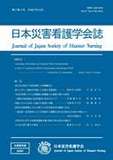Japanese
English
- 有料閲覧
- Abstract 文献概要
- 参考文献 Reference
- サイト内被引用 Cited by
要約
本研究は、災害急性期に看護師が他職種と行っている連携の要因を明らかにすることを目的とし、災害急性期に救護活動を行った経験のある看護師4名に、半構成的な個人面接を行った。面接では救護活動での他職種との連携を具体的に語ってもらい、その実態を把握し、看護師の他職種との連携に関する要因について抽出した。その結果、連携の促進要因として4つのカテゴリーと10のサブカテゴリー、阻害要因として3つのカテゴリーと8つのサブカテゴリーが抽出された。災害急性期に救護活動を行う看護師の連携について、初対面である他職種といかに短時間で良好な人間関係を構築していくかということが特徴であり、他職種との専門領域の違いを理解し、その専門性を知ることが連携の第1歩となる。また、基本的な看護実践能力、救急医や救急救命士と救急処置を行う技術、災害医療特有の知識と技術が重要であると考えられた。
The aim of this study was to clarify factors behind collaboration between nurses and other professionals in the acute phase of disasters. Individual semi-structured interviews were conducted with four nurses who had engaged in relief activities during the acute phase of disasters. The nurses were asked to talk specifically about collaboration with other professionals in relief activities in order to highlight the realities of such joint work and related factors. The results revealed four categories (with ten subcategories) of collaboration-promoting factors and three categories (with eight subcategories) of obstructive factors. Important factors for collaboration with professionals providing relief activities during the acute stage of disasters included quick establishment of strong interpersonal relations with new colleagues. Understanding the expertise of other professionals is the first step of collaboration. Basic practical nursing skills and techniques for the provision of treatment in conjunction with physicians and paramedics were considered important, along with expertise and ability in disaster medicine.
Copyright © 2015, Japan Society of Disaster Nursing All rights reserved.


